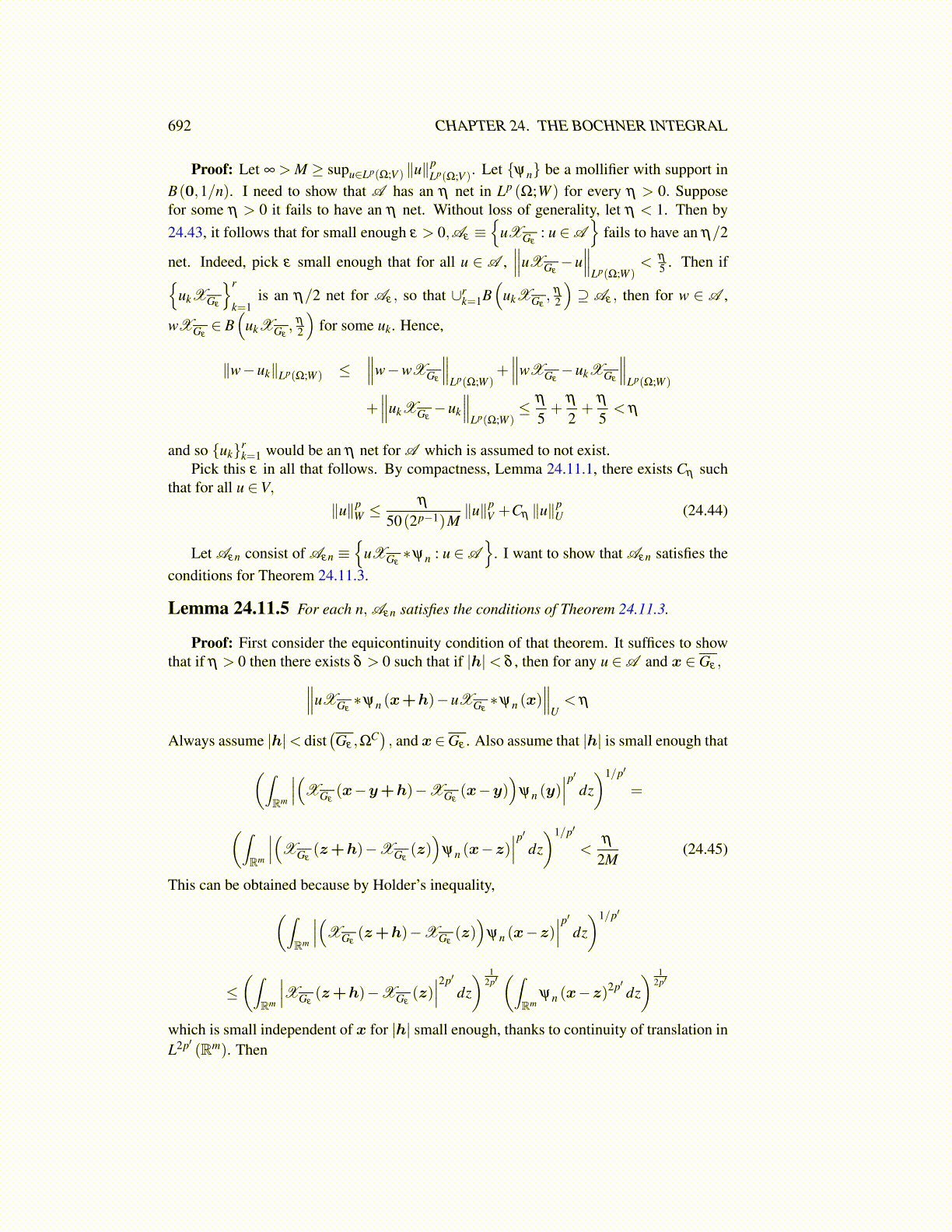
692 CHAPTER 24. THE BOCHNER INTEGRAL
Proof: Let ∞ > M ≥ supu∈Lp(Ω;V ) ∥u∥pLp(Ω;V )
. Let {ψn} be a mollifier with support inB(0,1/n). I need to show that A has an η net in Lp (Ω;W ) for every η > 0. Supposefor some η > 0 it fails to have an η net. Without loss of generality, let η < 1. Then by24.43, it follows that for small enough ε > 0,Aε ≡
{uXGε
: u ∈A}
fails to have an η/2
net. Indeed, pick ε small enough that for all u ∈ A ,∥∥∥uXGε
−u∥∥∥
Lp(Ω;W )< η
5 . Then if{ukXGε
}r
k=1is an η/2 net for Aε , so that ∪r
k=1B(
ukXGε, η
2
)⊇ Aε , then for w ∈ A ,
wXGε∈ B
(ukXGε
, η
2
)for some uk. Hence,
∥w−uk∥Lp(Ω;W ) ≤∥∥∥w−wXGε
∥∥∥Lp(Ω;W )
+∥∥∥wXGε
−ukXGε
∥∥∥Lp(Ω;W )
+∥∥∥ukXGε
−uk
∥∥∥Lp(Ω;W )
≤ η
5+
η
2+
η
5< η
and so {uk}rk=1 would be an η net for A which is assumed to not exist.
Pick this ε in all that follows. By compactness, Lemma 24.11.1, there exists Cη suchthat for all u ∈V,
∥u∥pW ≤
η
50(2p−1)M∥u∥p
V +Cη ∥u∥pU (24.44)
Let Aεn consist of Aεn ≡{
uXGε∗ψn : u ∈A
}. I want to show that Aεn satisfies the
conditions for Theorem 24.11.3.
Lemma 24.11.5 For each n, Aεn satisfies the conditions of Theorem 24.11.3.
Proof: First consider the equicontinuity condition of that theorem. It suffices to showthat if η > 0 then there exists δ > 0 such that if |h|< δ , then for any u ∈A and x ∈ Gε ,∥∥∥uXGε
∗ψn (x+h)−uXGε∗ψn (x)
∥∥∥U< η
Always assume |h|< dist(Gε ,Ω
C), and x∈Gε . Also assume that |h| is small enough that(∫
Rm
∣∣∣(XGε(x−y+h)−XGε
(x−y))
ψn (y)∣∣∣p′ dz
)1/p′
=
(∫Rm
∣∣∣(XGε(z+h)−XGε
(z))
ψn (x−z)∣∣∣p′ dz
)1/p′
<η
2M(24.45)
This can be obtained because by Holder’s inequality,(∫Rm
∣∣∣(XGε(z+h)−XGε
(z))
ψn (x−z)∣∣∣p′ dz
)1/p′
≤(∫
Rm
∣∣∣XGε(z+h)−XGε
(z)∣∣∣2p′
dz) 1
2p′(∫
Rmψn (x−z)
2p′ dz) 1
2p′
which is small independent of x for |h| small enough, thanks to continuity of translation inL2p′ (Rm). Then